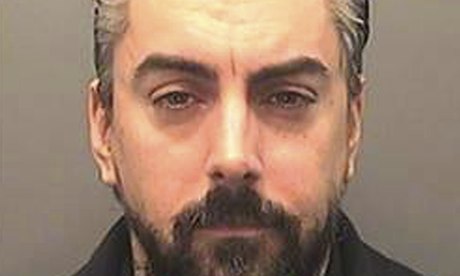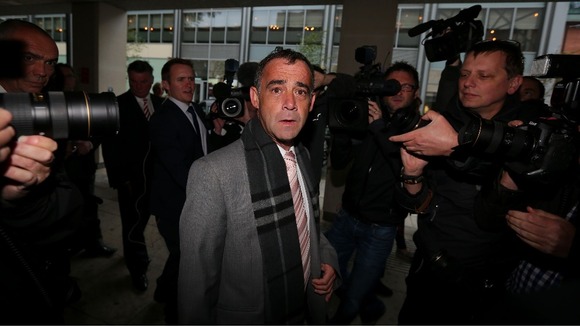Image Source: http://www.theguardian.com/uk-news/2013/dec/18/ian-watkins-transcript
– Jessica Randell (LLB Law, Newcastle University) j.m.randell@ncl.ac.uk
In September 2013 I wrote a blog post entitled, ‘Guilty Until Proven Innocent: The Anonymity of Celebrity Defendants in Sexual Abuse Cases’. This served to evaluate the recent, highly publicised sexual offence trials concerning celebrity defendants including Jimmy Saville, Stuart Hall and Michael Le Vell.* These trials have grabbed the public’s attention and opinions are widely varied with respect to the media attention they receive during the criminal law process. Conversely, the aim of this post is to evaluate what happens after a guilty verdict has been reached with a focus on the newly introduced sentencing guidelines for sexual offences.
These guidelines, as issued by the Sentencing Council on the 12th December 2013, will affect over fifty sexual offences including rape, child sex offences and human trafficking. The focus is now on the impact these offences have had, and will have, on the victim(s) and shall generally result in harsher sentences as lengthened by aggravating factors. These changes have come about after consultation with victim groups, medical professionals and those involved in the legal system. It replaces the former guidelines which were issued almost a decade ago after the introduction of the Sexual Offences Act 2003.
This new system, coming into force in April 2014, will introduce higher starting sentences for crimes such as rape which, for top category sentences, will now begin at fifteen years. This had only previously been afforded to those who had committed multiple rapes. There is also a focus on the impact technology has had on sexual offences including, for example, the filming and photographing of the victim during an offence. This will constitute an aggravating factor available to the judiciary when deciding an individual’s sentence. Further, the concept of ‘ostensible consent’ has been removed; meaning a child over the age of thirteen’s consent cannot constitute a limiting factor on a defendant’s sentence. This has occurred because “children do not consent to their own abuse”.
Two of these definitive aggravating factors will, arguably, have a greater impact on the celebrity defendant. These include when there has been an abuse of trust arising from the exploitation of one’s status or image and, additionally, when a defendant’s ‘good character’ has been used to facilitate an offence. There are several questions which arise from this; is it right that a guilty celebrity’s fame should be used against them? Was this change invoked due to the recently publicised celebrity trials? And is this a move in the right direction?
Firstly, it must be emphasised that celebrity status or ‘good character’ will have no direct impact on the decision of the case itself. This is a factor to be brought into play when deciding the sentence of the guilty party who should have previously endured a just, open and fair trial in front of a jury. Thus what is being focussed upon is how these factors have been used to facilitate the offence in the first place; trust, status and ‘good character’ having been exploited to bring about the crime and deter victims from coming forward due to the fear of not being believed. It is submitted that if such factors are found to be present in a case then it is surely correct that they must be recognised in the sentencing process. Generally, these new guidelines have brought about a positive response. Whilst the objections to such measures remain unknown, it is submitted that those who will object to the measures will do so through the claim of miscarriage of justice in the trial process. If this is the case, then there are provisions to deal with this in our legal system which are available by the very nature of our appellate system. Further, it is arguable that it is not just celebrities who will be affected by these changes as, according to defence lawyer Nick Freeman, this may extend to MPs, church leaders and high profile businessmen. Nonetheless, for those who have used their public image to commit abuse, it is essential that this is recognised, whether the guilty party is a traditional ‘celebrity’ or not.
The new guidelines are said to focus on the effect the crime has had on the victim(s) involved, however, arguably, it may be suggested that the guidelines may be unduly harsh on certain sexual offence victims. The argument would run as follows; why should the ‘ordinary’ defendant (of ‘bad’ character?’) receive a lesser sentence than someone exploiting their public image? However, this argument would be a misunderstanding of the guidelines. Instead, all starting sentences, which are much higher than they ever used to be, are the same for all defendants. What the guidelines serve to present are several new aggravating factors which will be applied, or not, dependent on the circumstances of each individual case. This case-by-case basis approach to sexual offence cases is the best way to secure individual justice thus protecting the victim in accordance with the context of the crime that has been committed. This must be recognised as an undeniable positive advancement, particularly in that these aggravating factors will only ever make sentences longer, which is undoubtedly a Good Thing.
It has been argued by the Sentencing Council that these changes have not been invoked because of the recent celebrity trials due to the fact that investigations into sentencing guidelines have been on-going for some time. Can it really be said, however, that such trials have had no impact on these significant changes? There has been a public outrage in the wake of these guilty celebrity sexual offenders. Indeed, it is submitted that this outrage has arisen from the inconceivable notion that sexual predators have been able to use their influential background, and the platform provided to them by ever-supportive fans, to take advantage in the most despicable ways. It is hard to imagine that these views have not been taken into account and, if they have indeed been influential, then that is something to shout about not deny. Occurring in the media of late are graphic, disturbing and highly emotive accounts of these cases, including what, to whom and where, and the list of guilty, celebrity sex offenders is ever increasing. It is submitted that the law must reflect this and that these changes will enable that to happen.
If anything, it is a shame that these strict guidelines have not been invoked sooner and that they will only apply to those sentenced on or after 1st April 2014. This sad fact is evidenced by the recent case involving Ian Watkins, the Lostprophets front man. Watkins admitted, in November 2013, to a string of sex offences including the attempted rape of a baby, sexually assaulting a child under 13 and aiding and abetting a female co-defendant to sexually assault a child under 13. This was in conjunction with the finding of 90 images of child abuse on his computer alongside 22 images of bestiality. Watkins was recently sentenced, on 18th December 2013, for 35 years. Broken down, this constitutes a 29 year prison sentence, of which he will be expected to serve two thirds before being reassessed, alongside spending 6 years on license. The judge in the case, Mr Justice Royce QC, stated the following:
“You, Watkins, achieved fame and success as the lead singer of Lostprophets. You had many fawning fans. That gave you power. You knew you could use that power to induce young female fans to help satisfy your insatiable lust and take part in the sexual abuse of their own children.”
It can, therefore, be seen how the aggravating factors discussed above regarding ‘good character’ and status could have been used against Watkins, resulting in the increase of his sentence. His influence as a famous singer, and the power that came with that position, has been emphasised as instrumental in the crimes he has committed and, ultimately, this is exactly the kind of behaviour which the guidance serves to punish. However, whilst it can be argued that these changes should have been made sooner, they clearly represent a step in the right direction. If, as further investigations into Watkins continue, future convictions arise then one can only hope that the sentencing will occur on or after 1st April 2014. Indeed, it may even mean that the door is thrown open to encourage legitimate claims against this individual, and many others, which is essentially a part of the bigger picture when discussing issues regarding sexual offences convictions. The inciting of non-vexatious claims against sexual perpetrators must be encouraged and if the prospect of an impending, harsher prison sentence creates a world in which that becomes more feasible then these changes deserve to be greatly celebrated.
*Please note that Michael Le Vell was found not guilty On 10th September 2013

